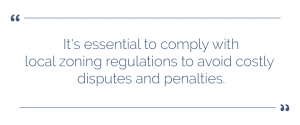

Updated on November 9, 2023
Let’s dive into details below,
Zoning laws are fundamental to real estate in California, impacting how properties can be used and developed. For property owners, understanding these laws is essential to make informed decisions.
Zoning regulates land use within a municipality. It controls the ways that land can be developed and what purposes the zoned land can serve. It is what makes a residential neighborhood residential, an industrial district industrial and so on.
In California, common zoning categories include residential, commercial, industrial, and mixed-use zones. Within these zones there are generally additional restrictions on land use. For example, some residential areas are zoned strictly for single family homes while other mixed-use zones may allow for select businesses, single family homes and multi-unit homes to exist in the same area.

Zoning laws change from city to city, so if you want to know how zoning laws affect your property, or a property you are considering buying, you will need to check your local zoning code.
Your local zoning ordinances affect what you are allowed to do with your property. While they are generally not overly restrictive, if you have plans to run a business from your garage or even to build a fence, it’s advisable to consult your local government first to ensure compliance. There may be restrictions ranging from maximum fence height to compliance with zone specific regulations on parking and accessibility for businesses. Alternatively, running a business from your home may be prohibited outright.
Zoning laws also govern building characteristics such as height, setbacks, and lot coverage. These regulations are designed to ensure that new construction and renovations align with the character of the neighborhood and do not adversely affect neighboring properties. However, if you are planning to build or renovate your home these regulations are an important consideration.

Property owners should stay informed about proposed zoning changes because they may significantly impact property values and potential uses. From time to time, municipalities pass new zoning laws that may result in existing property owners being out of compliance with the new regulations. This is called a non-conforming use..
If you were already in the rezoned area you may generally continue the non-conforming use. However, you may be required to obtain a conditional use permit or a variance. And if you have taken steps to develop your property and the municipality then tries to change the land use restrictions, you may have a vested rights claim.
Under a vested rights claim, property owners get to do what they were going to do before the rezoning.
Variances and conditional use permits are exceptions granted by the local government for the property owner to continue using their property in the nonconforming way. Variances allow property owners to deviate from standard zoning requirements due to unique circumstances or hardships, such as irregular lot shapes.
Special use permits, on the other hand, grant permission for specific land uses that may not typically be allowed in a particular zoning district, often subject to conditions.
Both variances and special use permits are typically granted through a process that involves public hearings and scrutiny by local authorities to ensure that the proposed deviations or uses align with the community’s best interests while respecting zoning laws.
Violating zoning laws can lead to legal issues and fines. It’s essential to comply with local zoning regulations to avoid costly disputes and penalties. However, navigating zoning laws in California can be challenging, so it is advisable to seek professional guidance from a real estate attorney or a local zoning expert.
They can help you understand your property’s zoning classification, interpret zoning codes, and assist with any zoning-related applications or appeals.
Our Los Angeles-based real estate attorneys at Schorr Law have helped many clients best protect their property and understand the intricates and variety of laws in the state of California as it pertains to real estate.
If you find yourself requiring assistance settling a zoning law dispute or any general real estate matter residential or commercial, you can contacts us today. Call us at 310-954-1877, text us at (310) 706-2265, or send us a message here.